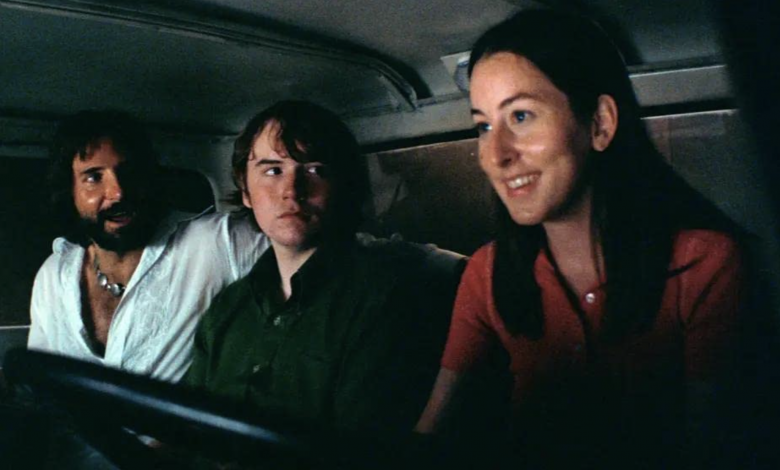Licorice Pizza Fails to Sell its Own Story

By Abigail Lee / Emertainment Monthly Staff Writer ‘25
In Licorice Pizza, Paul Thomas Anderson explores the dysfunctional lifestyles of the San Fernando Valley in the ‘70s. Anderson evokes an atmospheric discordance in which picture-perfect vistas give way to oil shortages and Hollywood stars smash windows, everything set to the sugary whine of ‘70s pop. Yet, despite the film’s attempts to approach the time period candidly, even satirically, it lacks the gravitational edge needed to pull the audience in.
The film follows the infatuation between a 15-year-old child actor named Gary (Cooper Hoffman) and a 25-year-old aspiring actress named Alana (Alana Haim). They meet at Gary’s high school where Alana is assisting as an employee for a yearbook photography company. Thus begins a formative friendship and partnership, as the two start selling waterbeds across the city. Both are charming and dysfunctional, childlike and earnest—their joint venture magnifies the characters’ shared capabilities as much as their immaturity. Their journey seems endless; in addition to the developments of the relationship, the film charts tangential stories to reveal more of Los Angeles. However, these proffered glimpses add no dimension to the city or to the characters. Instead, Anderson fashions a coming-of-age story that is so self-indulgent, it clogs arteries.
Hoffman and Haim are compelling leads, expertly deploying Anderson’s quippy dialogue and portraying the nascent romance. But everything around them fails. The sun-drenched plasticity of the Valley and the veneer of glamour and possibility is a distinctive backdrop, but Anderson’s desire to capture all of it seems aimless, lost. The film is such a discursive exploration of this era—an oil crisis, Hollywood disillusionment, casual corruption—that Gary and Alana’s relationship, stretched out over a winding route, loses its magnetism.
Anderson tries to depict the Valley’s complexities and contradictions, its absurdities that can somehow engender something real. But his evocation is so noncommittal that it renders everything inert. At a certain point, I wondered, what is the point of showing all of this? A filmmaker’s view will obviously be subjective; Anderson’s Valley is his Valley. Yet, Licorice Pizza negates the purpose of subjectivity: to show what is at stake, why the film takes the shape that it does. The part that exemplified the film’s idleness most was the scene(s) in which a white business owner (John Michael Higgins) speaks to his Japanese wife in a racist Japanese accent.
There is no doubt that this scene is meant to satirize the ignorance of Higgins’s character as well as the inane racism of the time period. It has, however, invoked a question of whether depicting something offensive can be an offense itself. In this case, the answer is yes. I went into the movie forewarned about these scenes; when the first one played, the audience let out a collective groan, interspersed with uncertain laughs. The ensuing online debate about the accent since the film’s release seems to be that it arrives out of nowhere, interrupting an otherwise innocuous film. But as I think about the movie in retrospect, the accent isn’t really out of line with the rest of its arbitrary elements.
Licorice Pizza suffers from a lack of conviction. Anderson tries to merge nostalgia with political reality, but he can’t shed his romantic lens on the ‘70s. It’s not so much that the film idealizes the time period; rather, it has nothing interesting to say about it, and thus its visualizations become saccharine. The image of Higgins’s Japanese wife, demure and blank, seems representative of Anderson’s evasive approach. It’s historically accurate and satirical and yet so faithfully stereotypical that it doesn’t transcend its own racism to serve some other purpose. The film in its entirety feels similarly lackluster in its efforts to evoke the Valley, which end up not doing much to convey the story.
The film gazes at the ‘70s Valley milieu while muddling its way through a love story. Will they or won’t they? Does it even matter?